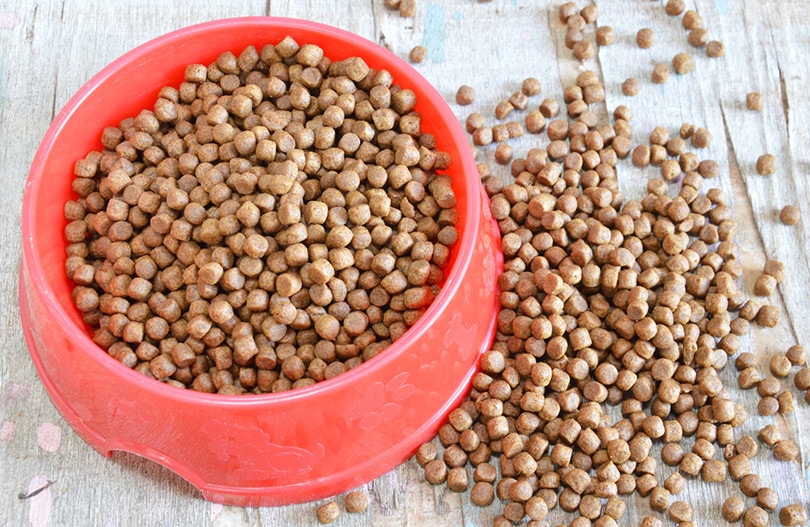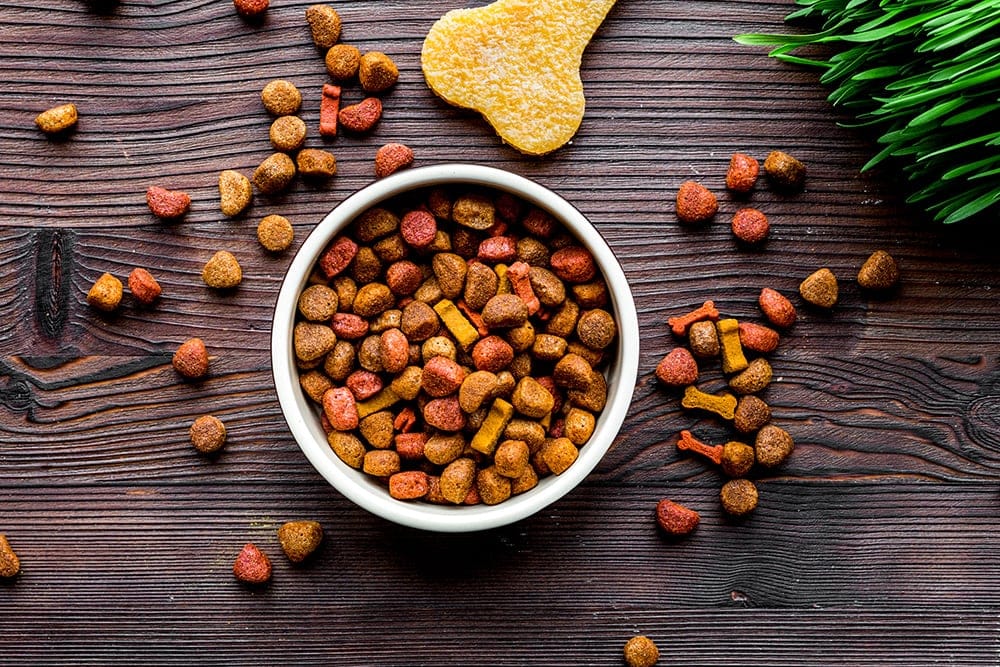How Much Crude Protein Should There Be in Dog Food? Our Vet Answers!
By Dr. Paola Cuevas, MVZ (Vet)
Updated on

If you’ve recently decided to try a paleo diet and had some success when it comes to building lean muscle and increasing your level of energy, you might be wondering if you should get your dog in on the magic by increasing their protein consumption. If so, your interest in eating right might have led you to wonder about protein, pet food, and precisely how much crude protein there should be in your dog’s food.
The Association of American Feed Control Officials (AAFCO), the organization that sets the requirements for commercial dog food, has determined that food for adult dogs should consist of at least 18% crude protein on a dry matter basis. Pregnant and nursing dogs, as well as puppies, have slightly higher needs and should be fed food with at least 22% crude protein on a dry matter basis. If a product fed daily contains less than those amounts, dogs will suffer deficiencies and get sick Generally your dog can greatly benefit from including more protein in their diet.
 What Do You Mean by “On a Dry Matter Basis”?
What Do You Mean by “On a Dry Matter Basis”?
Dog food labels provide a guaranteed analysis of the product’s ingredients, including crude protein, fat, fiber, and moisture. AAFCO recommendations refer to dry matter analysis: not the crude protein or fat numbers you actually see on the label.
As a general rule, there’s not much difference between the crude protein content you see on the label and crude protein content on a dry matter basis for most dry foods. But to get a good idea of how much protein your dog is getting from wet food, you’ll need to do a bit of math. The percentage of moisture content should be subtracted from the total product and then the remaining nutrients and ash can be calculated. Fortunately, there are several online calculators that’ll do the work for you!

Should I Feed My Dog an All-Meat Diet?
Unlike cats, dogs aren’t obligate carnivores their diet is a little bit more flexible and we can classify them as facultative carnivores or scavengers. This means that they can adapt and actually benefit from consuming some plant matter in their diets.
Dog’s teeth and gastrointestinal anatomy are basically that of a carnivore with sharp teeth made to catch and disable prey rather than flat molars made mostly for grinding plant matter.
However, dogs have evolved from carnivore species but some of their physiological adaptations allow them to safely consume and effectively digest limited amounts of plant matter, still, the majority of their diet should come from animal proteins and fats.
Is More Protein Better?
Not necessarily. “Super high protein dog food” is most often a marketing trick designed to please humans rather than a product designed to benefit your pet’s health. Just because a dog food is high in protein doesn’t mean that your dog’s body is going to benefit from the extra protein.
Sometimes the added protein is not readily bioavailable, making it essentially an expensive filler that your dog won’t be able to digest. Other times the proteins used are not complete, which means that they fail to provide your dogs with the amino acid precursors that they need in order to fulfill their nutritional requirements. This results in high protein but nutrient-deficient diets. Such as those cases of grain-free diets that contained high levels of pea proteins which resulted in dogs with taurine deficiencies and a consequent increase in dilated cardiomyopathy cases.
Dog food must include a complete and balanced source of nutrients and highly digestible ingredients that provide them with everything they need to thrive. Just throwing in more protein doesn’t translate into your dog’s body getting all the nutrients they need.

What About Food Allergies?
Canine allergies are related to an exaggerated immune response towards specific proteins such as those found in chicken, dairy products, beef, fish, and eggs. Most food allergy signs such as itchy skin, recurrent ear infections, and gastrointestinal issues are a result of your dog’s immune system recognizing a specific protein and triggering an immune response against it resulting in inflammation and loss of homeostasis.
Some signs of food allergies are non specific and can be pointing to other issues with the dog’s food, for example, vomiting and diarrhea, which can be due to infectious agents and if food-related, it could be caused by food that has too much fat or not enough fiber.
 Is It Harmful To Feed My Dog Too Much Protein?
Is It Harmful To Feed My Dog Too Much Protein?
Protein should be the base of your dog’s diet however, it’s harmful to feed your dog a diet consisting of nothing but protein; it’ll prevent your canine friend from getting the full range of nutrients they need. Also, entirely meat-based diets can be hard on your dog’s kidneys.
But each dog is unique and has unique needs as well. Very active and working dogs have higher protein requirements while dogs with specific medical conditions such as liver disease, kidney disease, or allergies need to have controlled and limited proteins in their diets.
Generally, if you’re giving your four-legged friend commercial dog food, you don’t have to worry about too much protein in their diet. Make sure to look for food with an animal-based protein such as whole chicken, duck, or beef listed first on the ingredient list to ensure your dog gets their protein from high-quality bioavailable sources that provide all the nutrients they need.
See also:
- What Is Crude Protein in Dog Food? Vet-Approved Benefits & Concerns
- Kidney Failure in Dogs – Symptoms, Causes, and Treatment (Vet Answer)
Featured Image Credit: nadisja, Shutterstock

 What Do You Mean by “On a Dry Matter Basis”?
What Do You Mean by “On a Dry Matter Basis”?










